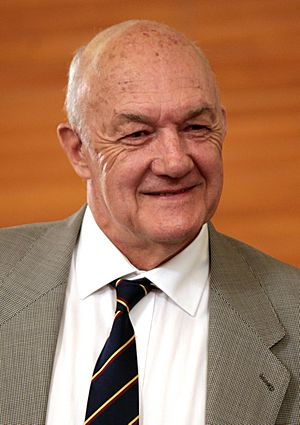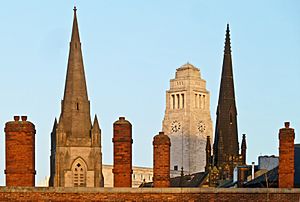Tom Shippey facts for kids
Quick facts for kids
Tom Shippey
|
|
|---|---|

In 2015
|
|
| Born |
Thomas Alan Shippey
9 September 1943 |
| Nationality | British |
| Education | King Edward's School, Birmingham |
| Alma mater | Queens' College, Cambridge (B.A., M.A., Ph.D.) |
| Occupation | Academic and writer |
| Known for | Tolkien scholarship |
| Scientific career | |
| Institutions | University of Birmingham St John's College, Oxford University of Leeds Saint Louis University |
Thomas Alan Shippey (born 9 September 1943) is a British expert on the Middle Ages. He is a retired professor who studied old English languages and literature. He also knows a lot about modern fantasy and science fiction books.
Many people think he is one of the best experts on the works of J. R. R. Tolkien. Tolkien wrote famous books like The Hobbit and The Lord of the Rings. Tom Shippey has written several books and many papers about Tolkien's work. His book The Road to Middle-Earth is often called "the single best thing written on Tolkien."
Mr. Shippey's life and career are quite similar to Tolkien's in some ways. He went to King Edward's School, Birmingham, just like Tolkien. He became a professional philologist, which means he studied languages and their history. He even held the same teaching job as Tolkien at the University of Leeds. He also taught Old English at the University of Oxford, using the same lessons Tolkien had created.
He has won several awards for his work, including three Mythopoeic Awards and a World Fantasy Award. He also helped with Peter Jackson's The Lord of the Rings movies. He helped the actors learn different accents. You can see him as an expert on the special DVD versions of The Lord of the Rings and The Hobbit movies.
Contents
About Tom Shippey
Early Life and Education
Thomas Alan Shippey was born in 1943 in Calcutta, which was then part of British India. He spent his first few years there. From 1954 to 1960, he went to King Edward's School in Birmingham.
Like J. R. R. Tolkien, Shippey grew to love Old English, Old Norse, German, and Latin languages. He also enjoyed playing rugby. He earned his first degree (B.A.) from Queens' College, Cambridge, in 1964. He later earned his M.A. in 1968 and his PhD in 1970.
His Career as a Medievalist
Mr. Shippey started his teaching career at the University of Birmingham. Then, he became a Fellow at St John's College, Oxford. There, he taught Old and Middle English. In 1979, he was chosen for a special teaching job at Leeds University. This was the same job that Tolkien once held.
In 1996, after 14 years at Leeds, Shippey moved to Saint Louis University in the United States. He taught, researched, and wrote books there. He has also been a visiting professor at other famous universities like Harvard University and the University of Texas.
He has written over 160 books and articles. He also helped edit important collections of scholarly works. These include Beowulf: The Critical Heritage (1998) and The Shadow-walkers: Jacob Grimm's Mythology of the Monstrous (2005). He has written many important articles about the Old English poem Beowulf. He also wrote about Arthurian legend, which are stories about King Arthur.
Mr. Shippey also wrote a book about the lives of the great Vikings. He explored how they thought as "warriors, invaders and plunderers." He looked at their "heroic mentality" and their unique sense of humor.
He retired in 2008 and moved back to England. Even after retiring, he has continued his research. His retirement was celebrated with a special collection of essays called a festschrift. This book, Constructing Nations, Reconstructing Myth, included writings from his former students and colleagues. Other similar books were published to honor his 70th birthday and his work in 2020.
Writing About Fantasy and Science Fiction
Tom Shippey has been a fan of science fiction since he was a teenager. In the early 1980s, he worked with writer Brian Aldiss. They discussed the idea of "world-building" for Aldiss's Helliconia book series.
He also wrote some books under the pen name "John Holm." He co-wrote a series of alternate history novels with Harry Harrison. These books imagine what might have happened if history had been different. The series included The Hammer and the Cross (1993), One King's Way (1995), and King and Emperor (1996). For Harrison's 1984 book West of Eden, Shippey helped create a special language called Yilanè.
Mr. Shippey has edited two important collections of stories: The Oxford Book of Science Fiction Stories and The Oxford Book of Fantasy Stories. For ten years, he reviewed science fiction books for The Wall Street Journal. He still writes book reviews for the London Review of Books.
In 2009, he wrote a long introduction for Flights of Eagles. This book was a collection of works by James Blish. He has also given many talks about Tolkien and other topics. In 2008, he published a collection of his articles on science fiction and fantasy called Hard Reading: Learning from Science Fiction.
His Work on Tolkien
Shippey's interest in Tolkien began when he was 14 years old. A friend lent him a copy of The Hobbit. He explains that he accidentally followed in Tolkien's footsteps in many ways:
- They both went to King Edward's School in Birmingham.
- They both played rugby for the Old Edwardians team.
- Shippey taught Old English at St. John's College, Oxford, for seven years, just as Tolkien was retiring.
- He became the Professor of English Language at Leeds, taking over Tolkien's old job and teaching the same lessons.

In 1969, he gave a talk called "Tolkien as philologist" at the University of Birmingham. Joy Hill, Tolkien's personal secretary, was there. She asked for his speech for Tolkien to read. In 1970, Shippey received a letter from Tolkien himself. Shippey said it took him 30 years to fully understand Tolkien's polite way of writing. Tolkien hinted that Shippey was "nearly" always right about his ideas. Tolkien also mentioned that his full plan could be found in a "large finished work." This was Tolkien's then-unpublished collection of stories, the legendarium. Shippey later used a phrase from Tolkien's letter, "Course of actual composition," as the title for the last chapter of his book The Road to Middle-earth.
Shippey and Tolkien met in 1972. Shippey was invited to dinner by Norman Davis, who had taken over Tolkien's teaching position. When Shippey became a Fellow at St. John's College that same year, he taught Old and Middle English using Tolkien's own lessons.
Shippey's first published essay about Tolkien was called "Creation from Philology in The Lord of the Rings." This essay expanded on his 1970 talk. In 1979, he was chosen for Tolkien's former job at Leeds University. He noticed that his office at Leeds was near Woodhouse Lane. He believed Tolkien would have thought this name hinted at the woodwoses, who were wild men of the woods.
His first book about Tolkien, The Road to Middle-earth, came out in 1982. In this book, he showed how Tolkien's work fit into the study of language history. He believed this was a major source of Tolkien's ideas. In 2000, he published Tolkien: Author of the Century. In this book, he showed how Tolkien's fantasy stories reflected important issues of the 20th century. These issues included industrial warfare, the origin of evil, and what it means to be human. He compared Tolkien's writing to other authors affected by war, like Kurt Vonnegut and George Orwell.
A bigger version of Road to Middle-earth was published in 2005. In this book, Shippey explained that The Lord of the Rings is a "war-book" and a "post-war book." He compared Tolkien's writing to other authors from the 20th century. Road to Middle-earth strongly argued against people who didn't like Tolkien's work. It also helped fans understand why they loved Lord of the Rings. This book has been called "the single best thing written on Tolkien." Both Road and Author have been printed many times and translated into other languages.
As a well-known expert on Tolkien, Shippey was part of the team that edited Tolkien Studies: An Annual Scholarly Review. Another scholar, Gergely Nagy, said that Shippey "has been (and still is) an enabler for all of us in Tolkien Studies." He called him "the veritable pope of the field."
Family Life
Tom Shippey married Susan Veale in 1966. After that marriage ended, he married Catherine Elizabeth Barton in 1993. He has three children. He retired in 2008 and now lives in Dorset, England.
Film and Television Appearances
Mr. Shippey has appeared in several TV shows. In these shows, he talked about Tolkien and his Middle-earth stories:
- 1984: Tolkien Remembered
- 1996: J.R.R.T.: A Film Portrait of J.R.R. Tolkien
- 1998: An Awfully Big Adventure: J.R.R. Tolkien
- 2002: Page to Screen: The Lord of the Rings
- 2003: J.R.R. Tolkien: Origins of Middle-Earth
He also helped with Peter Jackson's The Lord of the Rings movies. He helped the actors learn different accents. He was featured on the special DVD versions of The Lord of the Rings and The Hobbit movies. He said that working on the films was "good fun."
Awards and Honors
- 1984 – Mythopoeic Award for The Road to Middle-earth
- 2001 – Mythopoeic Award for J.R.R. Tolkien: Author of the Century
- 2001 – World Fantasy Award for J.R.R. Tolkien: Author of the Century
- 2008 – Mythopoeic Award for The Shadow-Walkers: Jacob Grimm's Mythology of the Monstrous
- 2008 – Honored with a special book of essays, Constructing Nations, Reconstructing Myth
- 2014 – Honored with another book of essays, Tolkien in the New Century: Essays in Honor of Tom Shippey
- 2020 – Honored with a third book of essays, Literary Speech Acts of the Medieval North: Essays inspired by the works of T A Shippey

